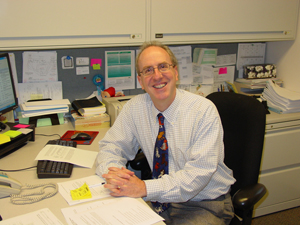 NOTE: This profile is part of a series highlighting the 25 researchers who were named UNMC Distinguished Scientists for 2006. Each of these researchers will be profiled in UNMC Today leading up to a March 12 ceremony to recognize their achievements.
NOTE: This profile is part of a series highlighting the 25 researchers who were named UNMC Distinguished Scientists for 2006. Each of these researchers will be profiled in UNMC Today leading up to a March 12 ceremony to recognize their achievements.
- Name: Jeffrey Bruce Payne, D.D.S.
- Title: Professor and F. Gene and Rosemary Dixon Endowed Chairman in Dentistry, College of Dentistry
- Joined UNMC: 1991
- Hometown: Bethpage, N.Y.
Q) Describe your research in 25 words or less.
A) I conduct human clinical trials using pharmacological approaches (i.e., medications such as non-antibiotic formulations of doxycycline) to treat bone loss and attachment loss associated with periodontitis (gum disease).
Q) How did you decide to pursue this area of research?
A) As a practicing periodontist, I have been extremely interested in how to improve treatment for my patients. The traditional approach to treat periodontitis is mechanical (i.e., surgical treatment or non-surgical deep scalings). This approach is time-consuming, costly and inconvenient to patients. Periodontitis is extremely common in the U.S. adult population; 35 percent of adults have periodontitis (gum disease that includes loss of bone and soft tissue attachment). Periodontitis has been associated with pre-term, low-birth weight babies, cardiovascular disease, poor diabetic control and respiratory infections. Although these associations are still being investigated by research laboratories throughout the U.S., it is commonly accepted that a person is not systemically healthy unless he/she is orally healthy. This statement is supported by the U.S. Surgeon General’s Report on Oral Health in 2000 (Dr. David Satcher was the U.S. Surgeon General at that time). Using pharmacological approaches as an adjunct to mechanical therapy may be able to improve the clinical outcomes of periodontitis treatment versus mechanical therapy alone. In addition, such improvement may have implications beyond the oral cavity.
Q) When did you realize you were interested in research?
A) I was interested in research as an undergraduate student in college and spent one semester doing independent research with one of my biology professors. I also did research during two summers in dental school. I then pursued advanced research training while a periodontology resident at the University of Connecticut.
Q) What are the greatest challenges in research today?
A) The greatest challenge is obtaining and retaining extramural research funding. The competition for funding is fierce and the NIH budget, after a five-year doubling period, is now flat.
Q) Best advice for new researchers?
A) Work hard, be open to receive mentorship, establish collaborations with scientists who have a track record of extramural research funding. Another piece of advice is to start working on grant applications early and have your grants reviewed by seasoned investigators prior to submission to a funding agency.
Q) When an experiment stalls, what drives you to continue on?
A) The intrinsic reward of overcoming difficulties to answer questions that can impact patient treatment drives me.
Q) Who has been your greatest teacher?
A) My research advisor, Dr. Frank Nichols, when I was a periodontology resident at the University of Connecticut, has been my greatest teacher. He taught me to continuously question things, question conventional thinking and think critically. Currently, my kids are my greatest teachers. I learn something from them every day and they help me keep things in perspective.
Q) Tell us about your family and hobbies outside the lab.
A) My wife is a dentist. We met in dental school. She was in the class that graduated one year after I did. She works part-time as a staff dentist at the Lincoln VA Medical Center. We have three children: Samantha, 16, Jeremy,12, and Jonah, 7. I enjoy spending time with my family. We go to sporting events together, play golf occasionally and garden. We also go to the kids’ events (e.g., baseball and basketball games and band concerts).
Q) Globally, describe the most notable research achievement ever?
A) The serendipitous discovery of penicillin is the most notable research achievement, in my view. This discovery has increased life expectancy dramatically with the cure of many bacterial infections. However, this is an area of research that will require further investment to develop new antibiotics, as resistant bacterial strains have become more prevalent over the past decade.
Q) Clarify a common misconception about research?
A) One misconception is that research will detract from an institution’s teaching program. In fact, research enhances the teaching program as faculty who are doing research are on the cutting edge in their respective fields.
Q) What would you tell a student interested in a research career?
A) Receive the best training you possibly can and pursue the research area that drives you and inspires you.
Q) List three things few people know about you.
- I was a sportscaster for both my undergraduate college and dental school radio stations.
- I am a political junkie.
- I am a huge hockey fan.